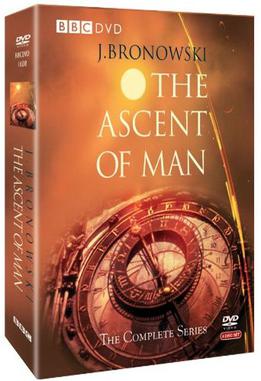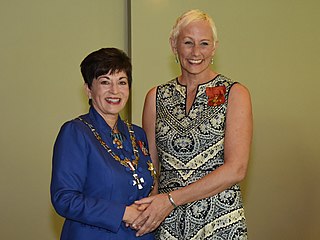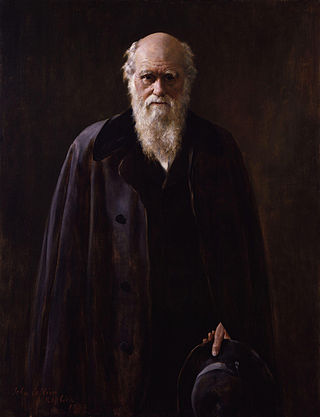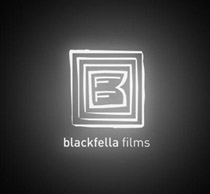Related Research Articles

A newsreel is a form of short documentary film, containing news stories and items of topical interest, that was prevalent between the 1910s and the mid 1970s. Typically presented in a cinema, newsreels were a source of current affairs, information, and entertainment for millions of moviegoers. Newsreels were typically exhibited preceding a feature film, but there were also dedicated newsreel theaters in many major cities in the 1930s and ’40s, and some large city cinemas also included a smaller theaterette where newsreels were screened continuously throughout the day.

The Ascent of Man is a 13-part British documentary television series produced by the BBC and Time-Life Films first broadcast in 1973. It was written and presented by British mathematician and historian of science Jacob Bronowski, who also authored a book adaptation. Intended as a series of "personal view" documentaries in the manner of Kenneth Clark's 1969 series Civilisation, the series received acclaim for Bronowski's highly informed but eloquently simple analysis, his long, elegant monologues, and its extensive location shoots. The programme began broadcasting on BBC2 at 9 pm on Saturday, 5 May 1973 and was released in the US 7 January 1975.

Searchlight Pictures, Inc. is an American film production company and a subsidiary of Walt Disney Studios, which is part of the Walt Disney Company. Founded in 1994 as Fox Searchlight Pictures, Inc. for 20th Century Fox, the studio focuses primarily on producing, distributing, and acquiring specialty films. Walt Disney Studios Home Entertainment distributes the films produced by Searchlight in home media under the 20th Century Studios Home Entertainment banner.

Television in Australia began experimentally as early as 1929 in Melbourne with radio stations 3DB and 3UZ, and 2UE in Sydney, using the Radiovision system by Gilbert Miles and Donald McDonald, and later from other locations, such as Brisbane in 1934.
The Nature of Things is a Canadian television series of documentary programs. It debuted on CBC Television on 6 November 1960. Many of the programs document nature and the effect that humans have on it, although the program's overall scope includes documentaries on any aspect of science. The program "was one of the first mainstream programs to present scientific evidence on a number of environmental issues, including nuclear power and genetic engineering".

Stan Grant is an Australian journalist, writer and radio and television presenter, since the 1990s. He has written and spoken on Indigenous issues and his Aboriginal identity. He is a Wiradjuri man.

Television documentaries are televised media productions that screen documentaries. Television documentaries exist either as a television documentary series or as a television documentary film.

Race Around the World was an Australian travel documentary and competition series produced by the Australian Broadcasting Corporation in 1997 and 1998. The series was brought to the ABC by filmmaker Michael Rubbo, and was based on the Canadian television series Course destination monde (1988–1999).

Planet Earth is a 2006 British television series produced by the BBC Natural History Unit. Five years in the making, it was the most expensive nature documentary series ever commissioned by the BBC and also the first to be filmed in high definition. The series received multiple awards, including four Emmy Awards, a Peabody Award, and an award from the Royal Television Society.

ABC News, or ABC News and Current Affairs, is a public news service produced by the Australian Broadcasting Corporation. Broadcasting within Australia and the rest of the world, the service covers both local and world affairs.

The Gibraltar Broadcasting Corporation (GBC) is Gibraltar's public service broadcaster. It has provided the community with a radio and television service since 1963.

The National Film and Sound Archive of Australia (NFSA), known as ScreenSound Australia from 1999 to 2004, is Australia's audiovisual archive, responsible for developing, preserving, maintaining, promoting and providing access to a national collection of film, television, sound, radio, video games, new media, and related documents and artefacts. The collection ranges from works created in the late nineteenth century when the recorded sound and film industries were in their infancy, to those made in the present day.

SBS is a national public television network in Australia. Launched on 24 October 1980, it is the responsibility of SBS's television division, and is available nationally. In 2018, SBS had a 7.7% audience share.

Leanne Pooley ONZM is a Canadian filmmaker based in Auckland, New Zealand. Pooley was born and raised in Winnipeg, Manitoba, Canada, she immigrated to New Zealand in the mid-1980s and began working in the New Zealand television and film industry before moving to England where she worked for many of the world's top broadcasters. She returned to New Zealand in 1997 and started the production company Spacific Films. Her career spans more than 25 years and she has won numerous international awards. Leanne Pooley was made a New Zealand Arts Laureate in 2011 and an Officer of the New Zealand Order of Merit in the New Year's Honours List 2017. She is a member of The Academy of Motion Picture Arts and Sciences.
Warren Brown is an Australian author, cartoonist and television presenter.
First Australians is an Australian historical documentary series produced by Blackfella Films over the course of six years, and first aired on SBS TV in October 2008. The documentary is part of a greater project that further consists of a book, a community outreach program and a substantial website featuring over 200 mini-documentaries.

Rachel Perkins is an Australian film and television director, producer, and screenwriter. She directed the films Radiance (1998), One Night the Moon (2001), Bran Nue Dae (2010), and Jasper Jones (2017). Perkins is an Arrernte and Kalkadoon woman from Central Australia, who was raised in Canberra by Aboriginal activist Charles Perkins and his wife Eileen.

Commemoration of Charles Darwin began with geographical features named after Darwin while he was still on the Beagle survey voyage, continued after his return with the naming of species he had collected, and extended further with his increasing fame. Many geographical features, species and institutions bear his name. Interest in his work has led to scholarship and publications, nicknamed the Darwin Industry, and his life is remembered in fiction, film and TV productions as well as in numerous biographies. Darwin Day has become an annual event, and in 2009 there were worldwide celebrations to mark the bicentenary of Darwin's birth and the 150th anniversary of the publication of On the Origin of Species.

Blackfella Films is a Sydney-based documentary and narrative production company, founded in 1992 by Rachel Perkins. The company produces distinctive Australian short and feature-length content for film and television with a particular focus on Aboriginal Australian stories. Its productions have included the documentary series First Australians, the documentary The Tall Man, the television film Mabo, and the TV series Redfern Now.
Priscilla Collins is a prominent Aboriginal leader, advocate and television producer. Collins is currently the Chief Executive Officer of the North Australian Aboriginal Justice Agency (NAAJA), the largest law firm in the Northern Territory of Australia.